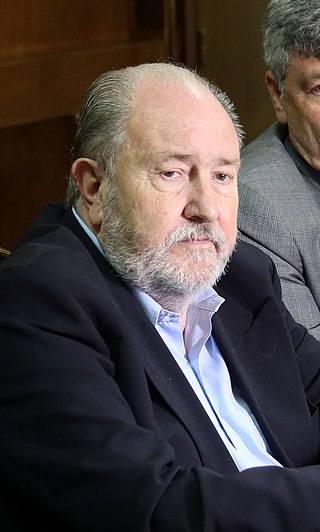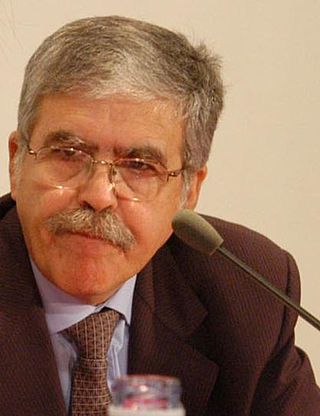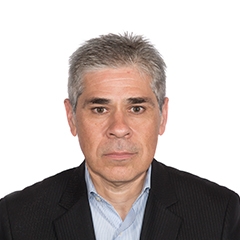
Eduardo Alberto Duhalde is an Argentine former peronist politician who served as the interim President of Argentina from January 2002 to May 2003. He also served as Vice President and Governor of Buenos Aires in the 1990s.

Néstor Carlos Kirchner Ostoić was an Argentine lawyer and politician who served as the President of Argentina from 2003 to 2007. A member of the Justicialist Party,he previously served as Governor of Santa Cruz Province from 1991 to 2003,and mayor of Río Gallegos from 1987 to 1991. He later served as the first ever First Gentleman of Argentina during the first tenure of his wife,Cristina Fernández de Kirchner Ideologically,he identified himself as a Peronist and a progressive,with his political approach called Kirchnerism.

Adolfo Rodríguez Saá is an Argentine Peronist politician. Born in a family that was highly influential in the history of the San Luis Province,he became the province's governor in 1983,after the end of the National Reorganization Process military dictatorship. He remained governor up to 2001,being re-elected in successive elections.

Héctor Icazuriaga is the former Secretary of Intelligence of Argentina who served from 2004 until 2014.

JoséManuel de la Sota was an Argentine politician who was a member of Justicialist Party. He was the governor of Córdoba Province from 1999 until 2007,and was reelected to the post for the 2011–15 term.

Mario das Neves was an Argentine politician who was twice governor of Chubut Province,from 2003 to 2011 and again from 2015 until his death in 2017.

Eduardo Alfredo Fellner is an Argentine Peronist politician. He was President of the Argentine Chamber of Deputies and governor of Jujuy Province for two terms.

Carlos Alberto Verna is an Argentine Justicialist Party (PJ) politician who was governor of La Pampa Province twice,from 2003 to 2007 and from 2015 to 2019. He was also a National Senator for La Pampa for two terms,and served as intendente (mayor) of General Pico.

Carlos Eduardo Rovira is an Argentine Justicialist Party (PJ) politician,until 2007 governor of Misiones Province at the head of the Front for the Renewal of Concord.
Carlos Alberto Sancho is an Argentine Justicialist Party (PJ) politician and former governor of Santa Cruz Province.

Alicia Margarita Kirchner Ostoić is an Argentine politician. She is the elder sister of the late former President Néstor Kirchner and served in his government as Minister of Social Development,a role which she held under President Cristina Fernández de Kirchner,her sister-in-law,until the end of her presidential term on 9 December 2015. She served two consecutive terms as governor of her native Santa Cruz Province from 2015 to 2023.

Daniel Román Peralta is an Argentine Justicialist Party politician who was governor of Santa Cruz Province from 2007 to 2015.

Julio Miguel de Vido is an Argentine politician who was Minister of Planning and Public Investment between 2003 and 2015.

Arturo Puricelli is an Argentine lawmaker. He served as Governor of Santa Cruz Province (1983–87),and as the country's Minister of Defense (2010–13) and Security (2013).

Federal Peronism,also known as Dissident Peronism,is the faction or branch of either moderate,centrist or right-wing Peronism,that is currently identified mostly by its opposition to Kirchnerism,the left-wing faction of Peronism.

Eduardo Ariel Arnold is an Argentine politician. He has been vice governor of the Santa Cruz Province under Néstor Kirchner,and a national senator and deputy.

Alberto Carlos Zannini is an Argentine lawyer and politician who was the Legal and Technical Secretary of the Presidency under presidents Néstor Kirchner and Cristina Fernández de Kirchner from 2003 to 2015.

Máximo Carlos Kirchner is an Argentine politician who has served as a National Deputy since 2015. He is the son of two former presidents of Argentina,Néstor Kirchner and Cristina Fernández de Kirchner. A member of the Justicialist Party,he is the co-founder of La Cámpora,a political youth organisation which supported the presidencies of his parents.

Eduardo Bauzá was an Argentine lawyer and politician who served as Minister of Health and Minister of the Interior during Carlos Menem's presidency and was later the first Chief of the Cabinet of Ministers. He was member of the Argentine Senate from 5 June 1996 to 10 December 1999.

Pablo Gerardo González is an Argentine politician who served as a National Deputy and a National Senator for Santa Cruz. A member of the Justicialist Party,González also served as Vice Governor of Santa Cruz under Alicia Kirchner from 2015 to 2019. Since 2021,he has been president of YPF,Argentina's state-owned energy company.



















